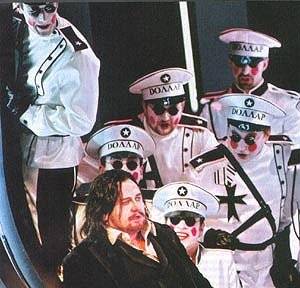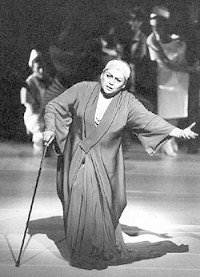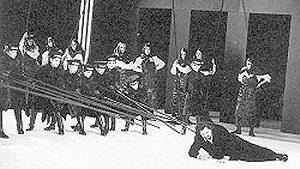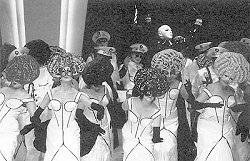Stuttgart maintains a lively opera scene, with repertory staging of a well varied programme; during the first half of February they put on Turandot, Fledermaus, Alcina, Love of Three Oranges, Rheingold and Poppea as well as this revival of their striking production of The Queen of Spades. It was at once enormously entertaining and also disturbing and thought provoking.The director Johannes Schaaf depicts the gradual descent towards degradation and death, to which all the main protagonists are fated, by using various techniques to distance the events and counter the easy emotional response which Tchaikovsky's over-heated music suggests. Reinhard von der Thannen provided memorable costumes and stage pictures - entirely unrealistic, the basic setting, with banks of flashing light bulbs and a central arc of light, reminding one of cinemas of the thirties.

The anti-hero Hermann (Vladimir Kouzmenko, a robust 'Heldentenor') is isolated and introspective from the outset, a marked outsider. The deployment of the large operatic chorus, so important in this score, brings out the director's imagination again and again. A teasing girl from the children's chorus traps him with her hoop, with uneasy resonance; a group of uniformed boy cadets appropriate cleaners' brooms, surround Hermann and turn them upon him as imitation guns. He feels menaced by his fellow army officers who urge him to play cards. He is quickly perceived as doomed by the threats of succumbing to his twin obsessions, the irreconcilable love for Lisa (another's woman) and the overwhelming obsession with gambling, which takes over and will destroy him. He is in thrall to the gambler's delusion of winning untold wealth, and puts aside the possibility of failure, only to become enmeshed with the illusory secret of the cards and eventually picking the card of death, the Queen of Spades.
Lisa (Angela Denoke)
Countess (Elena Souliotis)
Lisa (Angela Denoke) is portrayed variously, showing her own conflicts. A schoolgirl heiress to riches from her grandmother, she is seen amongst frivolous, playful girls in a dormitory. But she is already engaged, and by indulging herself in a hopeless romance with Hermann, which is doomed to disillusion and loss of self-respect, she is seen to be squandering her prospects of a conventional future in aristocratic society. A masked-ball scene is alienating, with the chorus now stylised puppet figures, all in cool black and white; no fun to be had at that ball. Lisa is seen tending the Countess (Elena Souliotis), and the female chorus now becomes a multitude of uniformed nurse/servants. After the Countess dies, whilst Herman is desperately trying to wrest from her the fatal secret, Lisa begins to suspect that her lover is criminal as well as obsessive. She too is left with no escape but death in this increasingly dark saga. At the end of this vivid interpretation of Pushkin's resonant story, the bright lights darken, the arc splits and bends, entombing Herman.Against this dominating visual imagery is Tchaikovsky's music, dramatic and powerfully emotive, given at Stuttgart with fine conviction under Oleg Caetani. The company cast is strong and the opera is given in Russian with German surtitles. The Staadtheater is a fairly small, intimate opera house, so the impact from stage and orchestra pit is strong. The singing was of high quality and the production, originally from January 1999, seemed in fine fettle. This was an evening well worth a detour or, in our case, the difficult choice to miss the final concert of the Eclat contemporary music festival, attending the rehearsal instead.
Peter & Alexa Woolf





 Return to:
Return to: